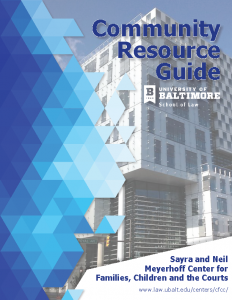CFCC staff and University of Baltimore law student fellows are developing a comprehensive guide to community-based resources which help families address the wide range of issues that could lead to involvement with the child welfare system and/or the criminal legal system.
Our goal in developing this online resource guide is to empower families in the Baltimore region to access services and avoid involvement that could lead to negative system intervention impacts such as family separation, school suspension or parental incarceration.
Families living in poverty are at greatest risk of child welfare and/or criminal legal system involvement.
For many families struggling with challenges related to poverty, system involvement can be avoided with support from resources such as mental health counseling, substance use treatment, housing or food access. Yet it can be difficult for the families most in need to find and access these services, even in the best of times. It is no secret that during the COVID-19 pandemic more families are struggling, as are the institutions that usually provide them with care and assistance. Many service providers are operating at reduced capacity or have been forced to close their doors.
CFCC’s Community Resource Guide focuses on providing the families in greatest need with easy access to a list of community-based providers that are open during the pandemic, delivering services that so many people desperately need and offering services that are accessible to families with no health insurance or Medicaid coverage. We have also highlighted organizations providing services in languages in addition to English, as well as those focused on serving the LGBTQ+ community.
We need your input.
We will continuously update the Guide to include more categories of services and to update the list of providers. In the future, we hope to create a printable version of the Community Resource Guide for families who lack reliable internet access.
If your organization provides services for low-income or other marginalized members of our community and would like to be included in the Guide, email us with information on your organization at cfcc@ubalt.edu. We are so appreciative of the dedicated people and institutions that continue to serve our community under these challenging circumstances.
This updated Guide was released on February 1, 2022, to coincide with CFCC’s webinar on Primary Prevention.
